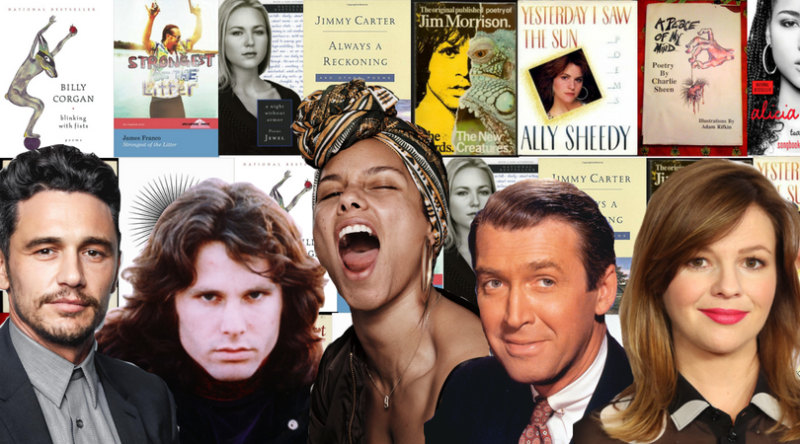
“What is a poet? An unhappy man who hides deep anguish in his heart, but whose lips are so formed that when the sigh and cry pass through them, it sounds like lovely music.”
-Soren Kierkegaard
*
Celebrities, eh? Why can’t they just stay in their lanes? Not content with rising to the very top of their chosen fields, many of this nation’s most beloved movie stars, musicians, politicians, and James Francos have gone in search of less familiar dragons to slay. Some generous souls out there might look upon these monied vagabonds as modern day Renaissance people. Others (probably many, many others) would dismiss them as little more than bored dilettantes, trading on their renown and connections to rocket to the tops of mountains others have been doggedly, and usually unsuccessfully, climbing for years. I’m gonna go out on a limb and say that nowhere is this latter impulse felt more acutely than amongst the poets. Statistically the 13,354th least lucrative profession in the world (look it up), the last thing the poets need right now is some jumped-up little shit from Tinseltown sauntering into their Brooklyn reading series and/or Amazon sub-category and sucking all the air out of the room.
Still, they persist. Whether it’s Franco getting paid to do Hart Crane cosplay or Jewel having one of the best-selling poetry collections of all time (over 2 million copies shifted to date; I’m fairly certain only Rupi’s beating that figure), there are enough qualified success stories out there to convince, I’m sure, plenty more celebs that it’s worth swimming into unknown waters.
As we await the rise of America’s next top actor-poet, here are the first reviews of ten of our favorite celebrity poetry collections.
*
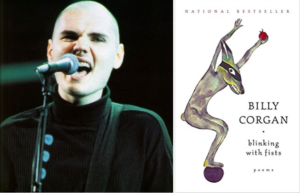
Blinking With Fists by Billy Corgan (2004)
Publisher said: “Crafted with a thoughtful and cadenced approach that shares the same allegiance to thunder and quiet found in his music, these writings further solidify Corgan’s place as the voice of a generation.”
Review said: “People are not buying Billy Corgan’s book because they are mistaking him for Billy Collins, the winsome former poet laureate. They are buying Blinking With Fists because Corgan, who led the influential band Smashing Pumpkins during the 1990’s, still has a following—he can seem like a geeky, gothy, brainiac version of Kurt Cobain. Corgan’s free verse is the kind of stuff that, if you’re skimming through looking for a line or two to ridicule, won’t let you down (‘I miss you already / Starting for home / The zombies keeping / All of it for themselves’). But at its best, Blinking With Fists is vivid and angular and not much worse than many first books of poems that arrive with heady praise from the poetry world’s burghers. In ‘Lost Gray,’ Corgan writes: ‘Stir, the crow cackle / Collar high / The angles black against the sides / Splitting in 2’s we swing clubs / Old fog rolls and hugs / Back slappin’ / Paying dues for crackjaws.’ I’m not sure I know what that means, but it beats the oracular utterances in Jim Morrison’s poems.”
–Dwight Garner (The New York Times)
*
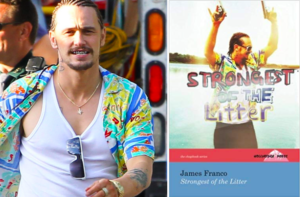
Strongest of the Litter by James Franco (2012)
Publisher said: “There is a vision of power at the center of James Franco’s first chapbook of poems, Strongest of the Litter. Power here is both generative and frightening, self-consuming and bracing. It is the artist’s power of self-making. These poems, thoroughly beautiful and spare, have the texture of contending angles.”
Review said: “Despite how anyone might feel, this chapbook is (chuckle to self) art. Despite being highly self-conscious, this is a whole new arrangement of letters and numbers on the page, and was written by a human being. It was irreverent for James Franco to write a book of poems and to modify language, and yes he was completely sincere. He’s not kidding. Not even like 1% kidding … these poems are about James Franco finding his authorial voice despite the fact that James Franco is temporal, he had never existed before a certain place in time and someday he will no longer exist as a body in a room. This is difficult for James Franco to negotiate. He will only exist as an artifact, and this is something that concerns James Franco on every page of this book … At no point in Strongest of the Litter do we lose our places. In fact I always know exactly where I am. I am sitting in my apartment reading a James Franco book. Time ticks by like an unsure and crippled ant. That is to say: Franco uses his fame as his subject. He does not want it any other way. This is his choice. Patti Smith does this too in her book Just Kids. It’s no new thing. However, Patti Smith is not hiding behind the machismo and preconceived notions of fame.”
–Amy Lawless (Vol. 1 Brooklyn)
*
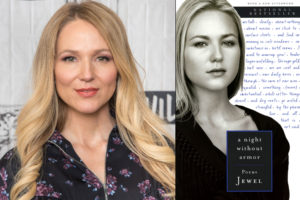
A Night Without Armor by Jewel (1998)
Publisher said: “Writing poems and keeping journals since childhood, Jewel has been searching for truth and meaning, turning to her words to record, to discover, and to reflect … Frank and honest, serious and playful … a talented artist’s intimate portrait of what makes us uniquely human.”
Review said: “Charles Bukowski once wrote, ‘To say I’m a poet puts me in the company of versifiers, neontasters, fools, clods, and scoundrels masquerading as wise men.’ Jewel Kilcher, a Bukowski fan responsible for the 10-million-selling pop-folk album Pieces Of You, is now happily joining this disreputable company with the release of her own collection of neontasting, A Night Without Armor. By now, Kilcher’s background is pop legend: A displaced Alaskan songstress living out of her van, she achieved great heights after being discovered in San Diego. Her image is so precious, so inflated in its storybook nature that it’s easy to want her poetry to suck outright or reveal too much of herself. It avoids that, but it also avoids many other things, such as deep insight into the human condition. Kilcher’s poetry is competent and sometimes evocative—most obviously in her barbed short poems—but her age and relative lack of experience show. When it comes to poems about sex, for example, she isn’t above resorting to purple clichés: ‘I’d be your hungry Valley / and sow your golden fields of wheat / in my womb.’ Sure, it’s more evocative than Ice-T’s ‘Let’s get butt naked / and fuck,’ but it’s not long on subtlety or cleverness, either. It’s hard to say what direction Kilcher’s poetry will take after this. Most of her influences, including the aforementioned Bukowski (or, as she spells it, ‘Bukowsky’) and Tom Waits, lived on the periphery for some time before being assimilated into popular culture, if at all. At 24, Kilcher may never again be able to escape into anonymity, and who really wants to read poems about how rotten it is to be rich and famous?”
*
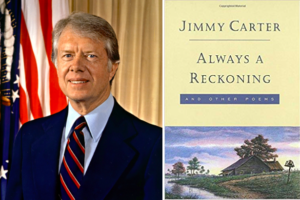
Always a Reckoning by Jimmy Carter (1995)
Publisher said: “The first collection of poetry by former President Jimmy Carter, who shares here his private memories about his childhood, his family and political life, with illustrations by his granddaughter.”
Review said: “At first glance, the vocations of poet and politician might seem completely antithetical. Poetry, after all, requires subtlety, introspection and fidelity to language, qualities not exactly valued by most politicians. Oddly enough, in the case of former President Jimmy Carter, the very qualities that helped cripple him as a politician are also the qualities that make him a mediocre poet … well-meaning, dutifully wrought poems that plod earnestly from point A to point B without ever making a leap into emotional hyperspace, poems that lack not only a distinctive authorial voice, but also anything resembling a psychological or historical subtext…
…
“What’s odd about these poems is that they give the reader plenty of information about Mr. Carter’s day-to-day experiences, while revealing little about his inner, imaginative life. The sentiments expressed tend to be generic ones, expressed in strangely abstract terms: sadness over a parent’s illness, nostalgia for childhood adventures, sympathy for the suffering of the poor, hope for a rosier future.”
–Michiko Kakutani (The New York Times)
*
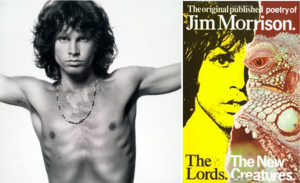
The Lords and the New Creatures by Jim Morrison (1970)
Publisher said: “An uninhibited exploration of society’s dark side—drugs, sex, fame, and death—captured in sensual, seething images. Here, Morrison gives a revealing glimpse at an era and at the man whose songs and savage performances have left their indelible impression on our culture.”
Review said: “Jim Morrison, lead singer and composer for ‘The Doors,’ gambols through indulgent ‘Bitter grazing in sick pastures.’ His characteristic fascination with incest, decay, death and dismemberment is all there; man retreats from reality into image, religion, alchemy, cinema (‘Camera inside the coffin interviewing worms’ and ‘A gray film melts off the eyes, and runs down the cheeks’). Morrison’s New Creatures are atavistic—’Lizard woman,’ ‘Jackal,’ ‘Mating-Queen.’ They are the natural enemies of the Lords whose ‘Art adorns our prison walls/ keeps us silent and diverted/ and indifferent.’ Provoking protest, subtle as a grenade, Morrison is equally sure of violent dislike or allegiance. When he’s good, he can transform even the unrecognizable into the commonplace.”
*

Yesterday I Saw The Sun by Ally Sheedy (1991)
Publisher said: “A collection of fifty poems that speak to the concerns of millions of young women, as Sheedy deals with love, men, and drug and alcohol rehabilitation.”
Review said: “Ally Sheedy is a wonderful poet. A collection titled Yesterday I Saw the Sun has just been published by Summit Books and is really moving. Ally told me she wrote the poems during various stages of her life since age 12. This is an extraordinary mind at work.”
–Larry King (USA Today)
*
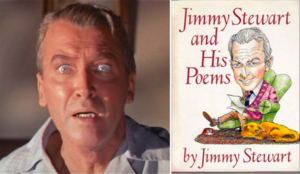
Jimmy Stewart and His Poems by Jimmy Stewart (1989)
Publisher said: “From fishing trips and dog stories to a hilarious account of a photo safari where the camera was lost to a hungry hyena, the poems are related in Jimmy Stewart’s inimitable voice and are enlivened with charming illustrations.”
Review said: “Jimmy Stewart. You love the guy, right? Me too. He’s a wonderful actor, a cultural treasure and an exemplar of the good, plain, American virtues. Now, the jacket copy of his new book says, ‘the consummate Everyman shares tales from his everyday life.’
‘I’m sure,’ Mr. Stewart tells us, ‘I never said to myself: “Now Jim—why don’t you sit down and write a poem.” It’s still a mystery to me.’ Isn’t that just the way of it? A fellow can be sitting around, doing no harm, and those muses will tackle him, throw him down and wrench poetry out of him. It’s a mystery, all right.
…
“He winds up with ‘Beau,’ a panegyric about a beloved dog: When he was young He never learned to heel Or sit or stay, He did things his way.
Mr. Stewart handles a trickier rhyme scheme in this one. The dog dies, and he misses him. It’s a heartbreaker.
The jacket copy of Jimmy Stewart and His Poems concludes that ‘the book confirms what we all expected—that the real Jimmy Stewart is every bit as endearing as the film characters he’s portrayed.’
Well, you’re not going to hear any argument from me.”
–Daniel Pinkwater (The New York Times)
*
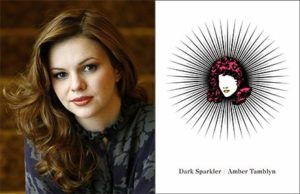
Dark Sparkler by Amber Tamblyn (2015)
Publisher said: “The lives of more than twenty-five actresses lost before their time—from Marilyn Monroe to Brittany Murphy—explored in a haunting, provocative new work by an acclaimed poet and actress … a surprising and provocative collection from a young artist of wide-ranging talent, culminating in an extended, confessional epilogue of astonishing candor and poetic command.”
Review said: “This third book of poems from actress Tamblyn could be a large-scale media event, but it’s also a good read … Here her poetic avocation takes on the perils of her primary career: the actress has created an energetic and formally varied collection focused on ill-fated starlets, dead actresses, and child stars. Some lines misfire, or sound garish, but many hit their mark … Reviewers may compare Tamblyn to James Franco, who also wrote poems about his own celebrity, but the two cases aren’t really alike: Tamblyn’s work seems less slick, and it’s more playful and far more personal, with highs and lows that stick around after the cameras are off.”
*

Tears for Water by Alicia Keys (2005)
Publisher said: “A revealing songbook of collected poems and lyrics that document her growth as a person, a woman, and an artist.”
Review said: “With their themes of loneliness, confusion, wonder and desire, most of Keys’s free-verse poems could be the cris de coeur of any American 20-something: ‘Sometimes I feel/ like I don’t belong anywhere/ And it’s going to take so long/ for me to get somewhere/ Sometimes I feel so heavy-hearted/ but I can’t explain/ cause I’m so guarded.’ But other poems hint at her world travels, her budding sense of social justice and her concerns about stardom (‘When gone is the glory/ When gone is the shine/ Is gone the whole/ Of your fortune and pride?;). Nearly half of the book consists of lyrics from her two albums, Songs in A Minor and The Diary of Alicia Keys; while they make a nice complement to the poems, the words feel a bit flat without the blaxploitation beat of ‘Heartburn,’ say, or the impassioned vocal delivery of ‘Fallin.’ For the Keys completist, however, this will be a compelling book of rock ephemera.”
*
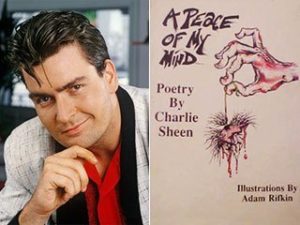
A Piece of My Mind by Charlie Sheen (1990)
Publisher said: “Self-Printed (August 3, 1990)”
Review said: “Charlie is a personal friend of mine, and I have been reading his poetry for years. This collection is the best of the best as far as Chas’ art is concerned. When one works on a show like Full House, one sees many forms of expression (from ‘you’ve got it dude’ to ‘Watch the hair!’ [my personal favorite!]). Sheen expresses the overall feeling of the modern man. From our disgust with the system (damn the man) to our love of Sheenistry … Ok, ok. Some of Sheen’s poems may be seen as obscene, that’s what I hear anyway. Well, thats trash. that is like saying c. thomas howell is a bad tennis player. Its just flat out not true. Sheen steals part of ourselves and gives us a chunk of humanity and Sheenathan. And, everything that is Sheentastic … I know that Sheen has given us all something to think about. Ok, I know what you are thinking: He is a drug addict/alcoholic. Nope. First of all, as Sheen once said, ‘nobody ever told me it wasnt ok to have a good time.’ I’ll vouch for that. I’ve known the man for quite a while, and never, I mean never, during that time did anyone tell the man that it was not ok to have a good time. Now, time to get down to the nitty gritty. The poetry. It is outstanding. Brilliant. Fun. Did I say outstanding? Yeah. I am going to go out on a limb here. Are you ready? Sheen has produced the greatest book of all time. Did i say the greatest book of all time? Yes. The greatest book of poetry of all time? Nope. The greatest book of all time. Why? Well I’ll answer that. Sheen is willing to take on the greatest of topics. I wont spoil anything, but lets just say he runs the gamut from A to F. F stands for a bad word. Now im going to introduce a new word. Sheenastia. verb.—to live life with the greatest of detailed theological reasoning known to the human form.”
–John Stamos, or someone purporting to be John Stamos (Amazon)
*
Hungry for more reviews of celeb lit? Of course you are. Check out what happens When Celebrities Write Novels

